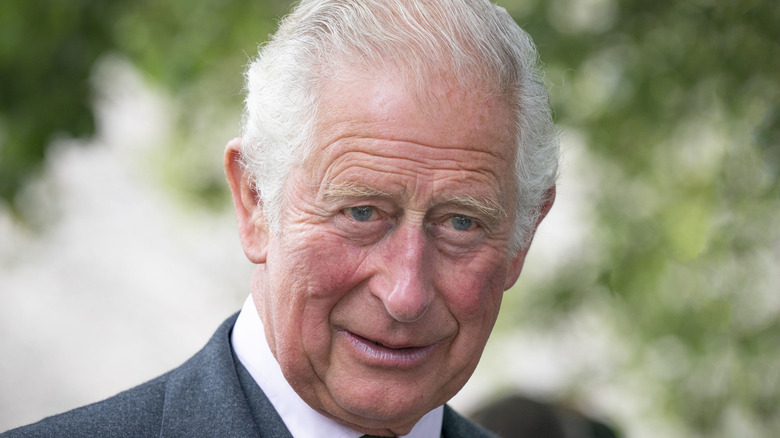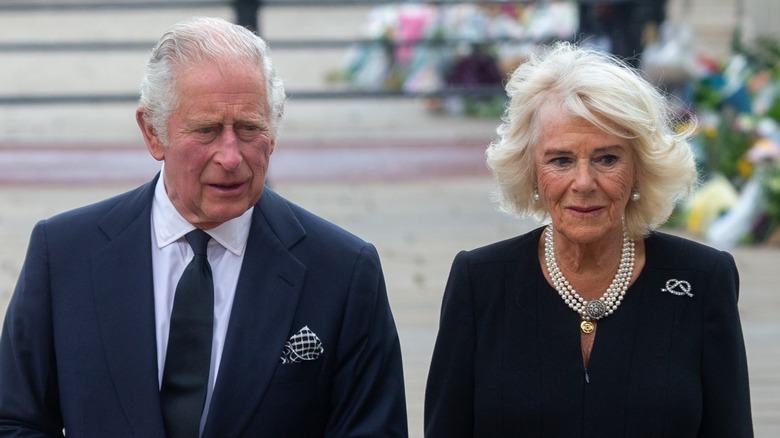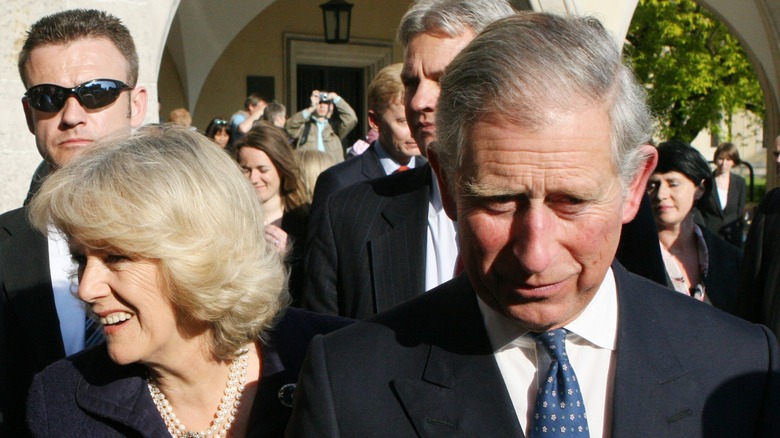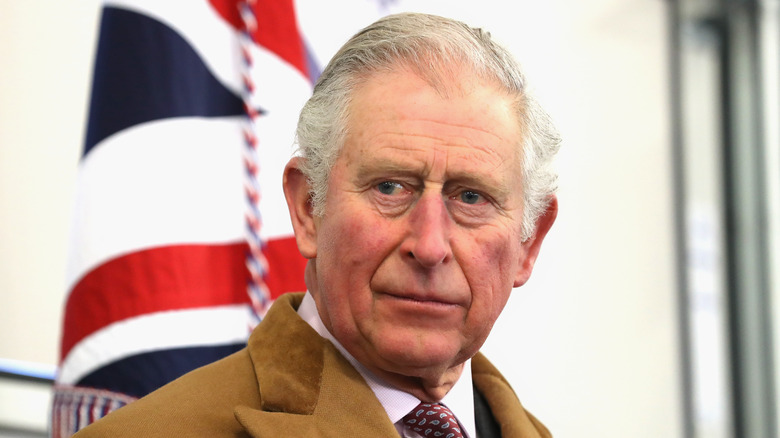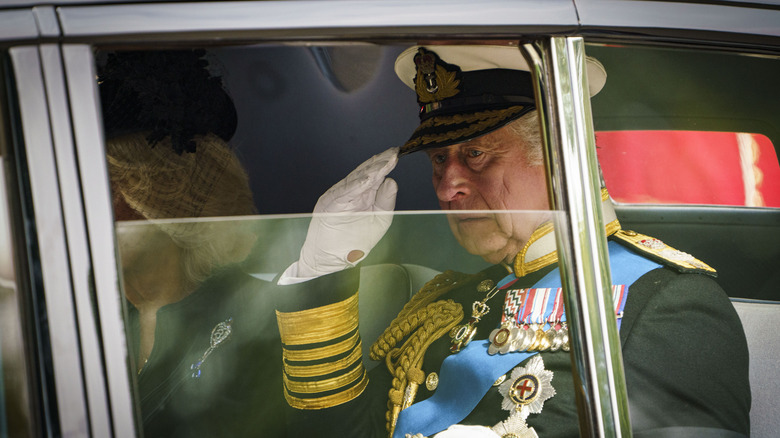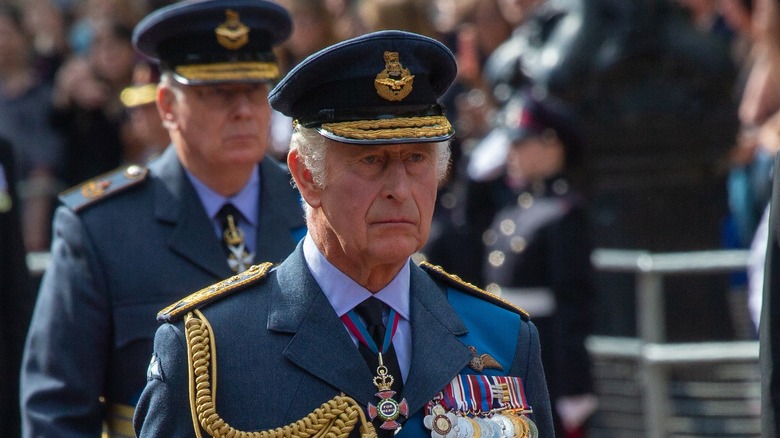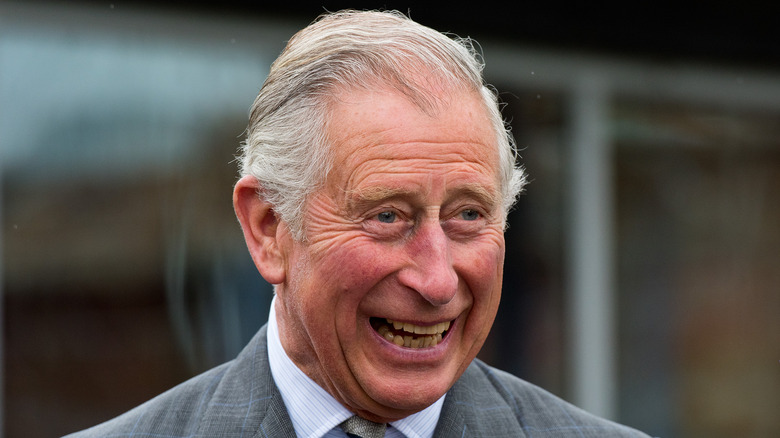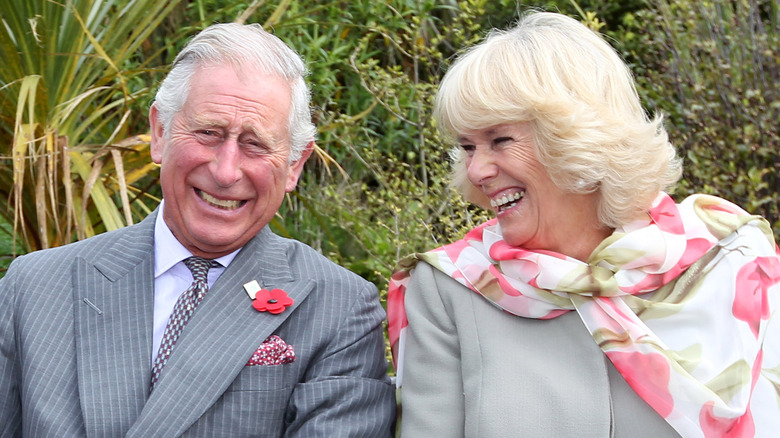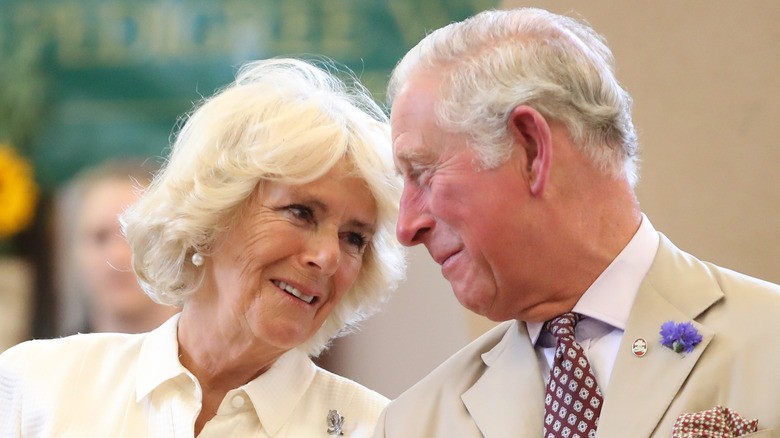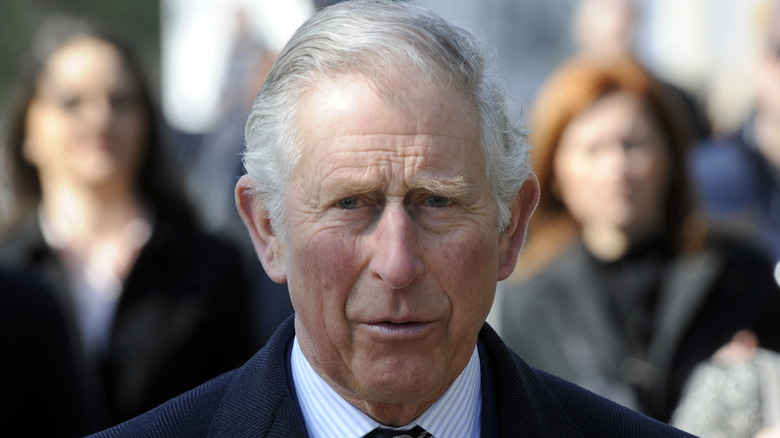Royal Rules King Charles And Camilla No Longer Have To Follow
Queen Elizabeth II died on September 8, 2022, ending the longest reign in the history of the British monarchy. She ruled as queen for 70 years, per the BBC, and died at age 96 at Balmoral Castle in Scotland. Family members rushed to her side, with the exception of Catherine, the Princess of Wales, and Meghan Markle, the Duchess of Sussex, according to Page Six. Despite that, Meghan made a statement after the queen's death that reflected her admiration for the late monarch.
While those two weren't at Balmoral, the family kept a united front during the funeral proceedings, which were remarkable and historical; for many, since the queen reigned for so long, it was the first time they had witnessed a British monarch's funeral. It was a touching affair, and King Charles III issued a statement that reflected the country's grief. "We mourn profoundly the passing of a cherished sovereign and a much-loved mother," he said, according to the BBC. "I know her loss will be deeply felt throughout the country, the realms and the Commonwealth, and by countless people around the world."
Due to the rules of succession, Charles became king the moment that his mother died, and his wife, Camilla, became queen consort. While he's already king, Charles and Camilla's coronation has been announced for May 6, 2023, per The Washington Post. Charles and Camilla are already enjoying special privileges that are afforded to the king and queen, especially these rules they no longer have to follow.
King Charles III won't pay a penny in inheritance taxes
One major exception afforded to King Charles III is that he is exempt from paying inheritance taxes on the fortune passed down from his late mother, Queen Elizabeth II. For reference, the average person would pay approximately 40% in taxes on an inheritance valuing more than $374,000, per NPR, so this is a huge boon for the new king. The decision that the British monarch would not have to pay an inheritance tax came about in 1993, when then-Prime Minister John Major agreed to a tax arrangement with the royal family. Major said, "In the unique circumstances of a hereditary monarchy, special arrangements are needed for inheritance tax."
So what did Charles inherit that skipped a potentially massive taxation? As Forbes estimates, he gained his mother's $500 million personal portfolio. A 40% tax on that amount would be huge. On top of this, he is responsible for the $42 billion fortune belonging to the crown, including palaces, estates, land, jewels, and other valuables. The tax deal of 1993 also freed the monarch from paying income tax; nevertheless, the queen said that she would voluntarily pay it. Charles, who was a prince at the time, also volunteered to do so, per The Guardian – and as king, he will likely do the same.
He doesn't need a passport to travel
Another perk of being king is that King Charles III won't have to use a passport when he jet sets all over the world. The rule was the same for the late Queen Elizabeth II. According to the official Royal website, the queen was exempt from needing identifying documents precisely because British passports are issued in the name of the monarch. Prior to her death, the first page of every issued passport read: "Her Britannic Majesty's Secretary of State requests and requires in the name of Her Majesty all those whom it may concern to allow the bearer to pass freely without let or hindrance and to afford the bearer such assistance and protection as may be necessary."
For the record, the queen was the only member of the royal family who was afforded this privilege. As Royal points out, even her husband, Prince Philip, and then-Prince Charles had to travel with a passport. However, by this logic, Charles as king will get the same exception.
The travel section of EuroNews raised questions about the validity of British passports after the queen died. Will passports still be valid now that there is a new monarch? The website said that yes, they'll still be workable, official documents and will likely change slowly, as expired passports are renewed, to reflect Charles' sovereignty on the documents.
The king won't be held to the Freedom of Information Act
The royal family, specifically the monarch, is exempt from the Freedom of Information Act (FOIA), which allows citizens to obtain information about public authorities. The royal family is not required to comply because, as the official Royal website points out, they are not technically a "public authority." However, the website does make one note: The royal family willingly provides information "to account openly for its use of public money" and to try and be transparent in many areas.
While this is all spelled out matter-of-factly on the Royal website, The Independent offered a scathing critique of this exemption in 2015. The article was prompted by the ways in which the palace was trying to protect Prince Andrew from sexual charges due to his relationship with Jeffrey Epstein. Author Yasmin Alibhai-Brown pointed out that not only does the royal family get a pass from the Freedom of Information Act, but they can also prevent press from coming out that could potentially damage their reputation. Alibhai-Brown called their "unchecked influence and lack of transparency" an unfair combination, and cited instances where the royal family stopped the BBC from airing two different documentaries. While it may be tradition, that doesn't mean the public is okay with this exemption.
He doesn't have to follow the speed limit
King Charles III doesn't have to comply with speed limits when driving. According to The Scottish Sun, the Road Traffic Regulation Act means that vehicles associated with police, fire, and ambulance services are exempt from following speed limits when they are performing their specific duties. The outlet is careful to note that this doesn't mean King Charles III can jump in a Range Rover and blast off by himself — it means that when the royal family, especially the sovereign, is on duty, they are always accompanied by a police escort, which allows them to surpass the speed limit.
"The law currently states that speed limits do not apply to any motor vehicle being used for police, fire and rescue authority, ambulance or Serious Organized Crime Agency (SOCA) purposes, if observing the speed limit would be likely to hinder the use of the vehicle for the purpose for which it is being used on that occasion," a rep for the Department for Transport told the outlet. "The [prime minister] and royal family are driven by the police so the driver would be exempt because the police have an exemption in law." But the royal family still arrives in style, no matter what speed they're going. Auto Evolution reported that when the first-time King Charles arrived at Buckingham Palace on official duty, he was chauffeured in a Rolls-Royce Phantom VI.
King Charles III can't be prosecuted
King Charles III enjoys the protection known as sovereign immunity. According to the Cornell Law School, this British law stemmed from "the idea that the king could do no wrong" and therefore the monarch cannot be arrested. The official Royal website addressed this exemption when Queen Elizabeth II was sovereign. "Although civil and criminal proceedings cannot be taken against the sovereign as a person under U.K. law, the queen is careful to ensure that all her activities in her personal capacity are carried out in strict accordance with the law," the site read (via Wales Online). Even though she knew she was protected, the queen made sure not to take advantage of her immunity.
Charles will be protected by the same immunity — and he might be more grateful for it than his mother. As Newsweek pointed out in September 2022, his longtime charity, The Prince's Foundation, has come under fire for accepting financial donations in exchange for granting "a Saudi tycoon" both U.K. citizenship and knighthood. While this isn't a good look for the foundation, the news outlet pointed out that Charles was never directly linked to the indiscretion, nor would he face legal trouble if he were, thanks to sovereign immunity.
The king can claim all the swans in England ... and eat them!
One of the wackier rules of the monarchy is that King Charles III and Camilla, the queen consort, can claim ownership of the swans in England and, should they wish, eat them. The antiquated rule goes back to earlier English rule, but is still in effect, for reasons of tradition or the possibility that no one has bothered to revise it. According to the Wildlife and Countryside Act of 1981 (cited by Legal History Miscellany), swans are still illegal to eat in England. As far back as the 12th century, swans were reserved for the monarchy and aristocracy and were considered a culinary delicacy. In current times, it is illegal to consume most swans because they are protected wildlife.
Despite the oddness of this rule, Charles still has a designated swan marker. The current holder of this title is David Barber, who served Queen Elizabeth II and then King Charles, per Express. "The king has the right to claim any swan swimming in open waters, unmarked, if he so wishes," Barber said. "Not all the swans belong to the king. But if he wishes to claim them, he can, by the royal prerogative." Barber also explained the history of swans as a food source. "Swans then were an extremely important food source and served up at banquets and feasts, really for the wealthy," he added, noting how the consumption of swans is now nonexistent in England.
King Charles III and Queen Consort Camilla don't have to serve jury duty
King Charles III and Queen Consort Camilla are off the hook when it comes to serving jury duty. As Insider points out, this privilege extends to not only the monarch and his spouse, but also to members of his immediate family. Prince William and Catherine, the Princess of Wales, also benefit from this royal loophole.
The exemption used to spread even further among the royal family. However, in 2003, The Guardian reported that several members of Parliament pushed back against the law, which allowed both "the royal family and the royal household" to opt-out of attendance at criminal trials "where it is confirmed their absence would cause inconvenience to Her Majesty." Many felt that this created a superior sense of exceptionalism and that it didn't serve the public. Desmond Turner, a member of Parliament, said, "The notion that anyone is too grand or too clever or too important to serve on a jury is not to be borne." So that eliminated a blanket pass for anyone in the royal family, but not for the monarch or immediate family members.
King Charles III doesn't need a driver's license, but Camilla does
There's one rule that King Charles III no longer has to follow, but Camilla, the queen consort, does: The king doesn't need to use a driver's license. The reason is that such official documents are technically issued by the monarch. The head of roads policy for Britain's Automobile Association, Jack Cousens, spoke to the Mirror in September 2022. "Driving [licenses] are issued by His/Her Majesty's government under His/Her Majesty's authority," Cousens said. As such, Charles does not need one.
However, the exemption doesn't extend to anyone else in the royal family. "Only the monarch receives this privilege, so all other royals would need a driving [license]," Cousens added. That means Camilla is required to obtain a license, as are Charles' immediate relatives.
The royal family has long been associated with their love of cars, much like their love of horses. In fact, Queen Elizabeth II enlisted in the Auxiliary Territorial Service during World War II, according to Time, when she worked as a mechanic and knew how to fix engines.
King Charles III doesn't use a legal last name
King Charles III has undergone a series of name changes throughout his life. As monarch, his official title is His Majesty The King, according to Express, and as such, he doesn't require a last name. Prior to this title, Charles was known as the Prince of Wales and the Duke of Cornwall.
Interestingly, the royal family had to reconfigure the last names of the offspring of Queen Elizabeth II and Prince Philip. Members of the royal family originally used Windsor as a surname, but after Philip and Elizabeth's children were born, the children used the hyphenated combination Mountbatten-Windsor, with Mountbatten coming from Philip's side. This is still in effect with Prince Harry and Meghan Markle's children, Archie Harrison Mountbatten-Windsor and Lilibet Diana Mountbatten-Windsor.
We've seen other cases of changed names since Charles became king. Prince William and his wife Catherine became the Prince and Princess of Wales. Their children got new names as well, according to E! News. Prior to that, Prince George, Princess Charlotte, and Prince Louis used Cambridge as a surname, and now they go by Wales. William also inherited another title that was previously held by Charles; he became the Duke of Cornwall and will manage the highly lucrative Duchy of Cornwall. So it might mean a revolving array of name changes, but it sure pays to be royal.
